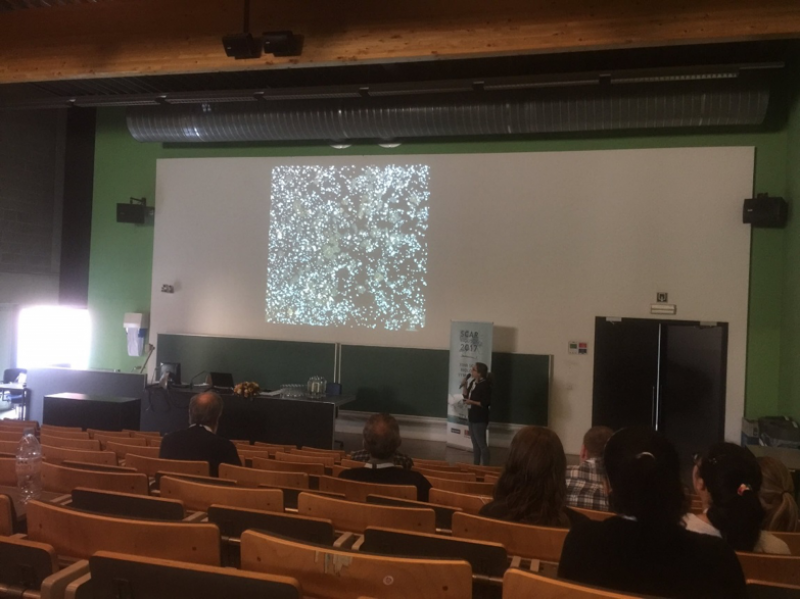SCAR Biology Symposium: Belgium
Leyre Villota Nieva
Bangor University

The 2017 SCAR Biology Symposium (SCARBio17) in Leuven, Belgium was a busy and information packed 6 day conference, covering a diverse range of Antarctic Biology related topics such as “Understanding Physiology (incluiding ‘-omics’ approaches)”, “Astrobiology”, “Adaptation and processes in top predators” amongst others. This year there were panel presentations from top physiologists and ecologists, a one day early career workshop organised by APECS (Association of polar early career scientists) and several lunch time and evening meetings. I was fortunate enough not only to attend the conference, but also to give an oral presentation on my current PhD research at the Physiology and omics” theme and attend the mARS meeting (Microbial Antarctic Resource System). This was only possible because of the generous funding by the Challenger Society for Marine Science.
SCAR Biology is held once every four years alternating between several destinations in the world and is the only conference specific to Antarctic Biologists. This is the only time Antarctic Biologists come together to discuss the state of the art and it’s an ideal conference for early career scientists to meet other researchers in the field and practice feeling comfortable presenting to a larger audience. This was a very important conference for me to attend, since it would not happen again during the course of my PhD. The conference was very well attended, with teams coming from all over the world: from Chile to New Zealand amongst others. This was an invaluable experience, particularly because although we all worked on Antarctic Biology, it is not often that we get to meet each other in person and share our research.
My oral presentation was titled “Heating up the ocean: effects of in situ oceanic warming on marine benthic recruitment and community development” and focused on one chapter from my PhD thesis: the heat shock response and acclimation in Romanchella perieri, an Antarctic benthic worm. I generated much interest in the topic and received some positive feedback from the presentation.
Most valuable to me however, were the connections I made outside my normal UK Antarctic network. It was very exciting to finally meet researchers such as Chris Cheng from the University of Illinois (USA), who’s work I have studied very extensively but not had the opportunity to meet in person. She also attended my talk to my surprise! I walked away from the conference with new projects, new ideas and the satisfaction feeling of having presented part of my PhD research to such an experienced audience. Thank you again to the Challenger Society for Marine Science for providing me with the funding to attend this amazing conference.
Profile:
I am a third year PhD student at Bangor University and the British Antarctic Survey, studying the effects of in situ oceanic warming on marine benthic recruitment and community development in Antarctica. I am interested in understanding how organisms adapt to their environment. I look at how environmental stress affects organisms across many levels of biological organisation, from cellular to physiological responses and how this knowledge can help us predict future responses to climate change.
Latest News
Heat and carbon uptake in the Southern Ocean: the state of the art and future priorities
The following Royal Society Philosophical Trans A issue has been highly cited and downloaded - Heat and carbon uptake in the Southern Ocean: the state of the art and future priorities organised and edited by Andrew J S Meijers, Corinne Le Quéré CBE FRS, Pedro M S Monteiro, Jean-Baptiste Sallée and the articles can be accessed directly at www.bit.ly/TransA2249
Purchase the print issue at the reduced price of £40 by contacting sales@royalsociety.org
New Chief Executive at the National Oceanography Centre
Dr John Siddorn will officially start the role of CEO of the National Oceanography Centre (NOC) on 4 April 2024, bringing with him extensive experience in leadership in science, technology, and innovation. Dr Siddorn will be replacing Professor Ed Hill CBE, who announced his retirement from NOC in November 2023 after nineteen years of distinguished service leading the organisation. Full news story.
The Marine Environmental Data and Information Network (MEDIN) Open Meeting
The Marine Environmental Data and Information Network (MEDIN) invites the marine community, particularly those from a policy, commercial, academic and conservation background, to an open meeting to introduce the new MEDIN Business Plan 2024-2029 and to discuss how the wider community can contribute to the future developments in UK marine data management.
Wednesday 24th April 2024 – HYBRID (The Crown Estate, 1 St James's Market, St. James's, London SW1Y 4AH and online using Microsoft Teams)
